‘Like ghosts’: Inside an occupied apartment building in Ukraine
In a Hostomel apartment building, neighbours confront their destroyed homes with humour and sadness and vow to rebuild.
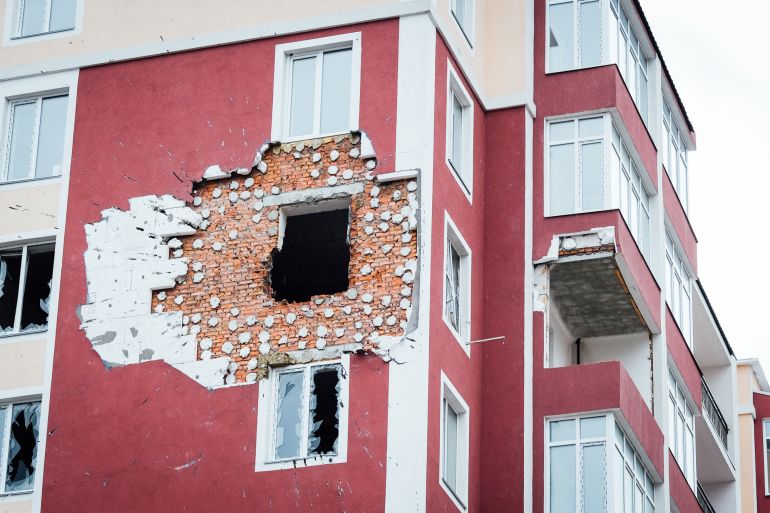
Hostomel, Ukraine – Andrii Kurpich, a towering, leather-clad 49-year-old chauffeur, manoeuvres his way through the dark and dingy basement of a half-ruined apartment block in Hostomel, a town about 20km (12 miles) northwest of Kyiv. Water drips from the overhead pipes into murky puddles and a stale humid smell hangs in the air.
This eerie underground network of corridors and partially flooded rooms was home to nine of the block’s residents, including Andrii and his wife, Viktoria Kurpich, for more than a week after Russian troops stormed the building on March 5, 2022.
Keep reading
list of 4 itemsHow a misplaced telephone pole saved a Ukrainian family
Escaping war: What Ukraine’s children carry with them
23:30: The last train to Bucharest
Viktoria, a cheerful 51-year-old homemaker with short blonde hair, dressed all in black, says she was “terrified the soldiers would kill us” when they knocked on their front door and ordered them outside with their hands up.
“However, they were calm and not violent with us,” she says, adding that residents of a property in a neighbouring block that belongs to the same apartment complex were not so fortunate. “Soldiers there just threw in a grenade when they opened the door,” she says, her voice cracking briefly with emotion.
“The ones who spoke to us were shocked that we spoke such good Russian; maybe this is what saved us,” she says with a shrug of her shoulders.
As the soldiers searched the terrified couple for weapons or communication devices, one of them said, “Don’t worry, we are here to save you from your president [Volodymyr Zelenskyy]”, before ordering them to the basement.
Russian President Vladimir Putin has justified launching Russia’s full-scale invasion of Ukraine on February 24 by emphasising the need to “denazify Ukraine” and “protect” Russian speakers in the country.
Andrii passes an alcove containing a soot-covered stove and enters a grey, nondescript room. He points a torch at a small glass mug surrounded by cigarette butts. “This is where we would have to go to the toilet,” he says in a matter-of-fact tone before taking a puff of his vape.
Viktoria pulls up a photo on her phone of the basement during the building’s occupation. It depicts a cosy dinner setting that is almost unrecognisable from today’s squalid conditions. A young smiling pigtailed girl sits with two other residents at a pull-out table full of food and non-alcoholic beer. “It was a quiet, friendly atmosphere. We would all cook, tidy and do crosswords to pass the time,” she says.
Viktoria is stoically dismissive when asked about the discomforts they faced, including freezing temperatures at night, preferring instead to focus on the resourcefulness and community spirit of the group. “We didn’t know how long we would stay so we had all filled buckets of food, large bottles of water and fuel from the cars for the stove,” she says.
Viktoria leaves the basement and heads towards the building’s smoke-stained stairwell. Natural light from the top floor, destroyed during heavy fighting, floods the building’s entryway. A drizzle falls between the bannisters amid the clatter of loose corrugated roof panels blowing in the wind.
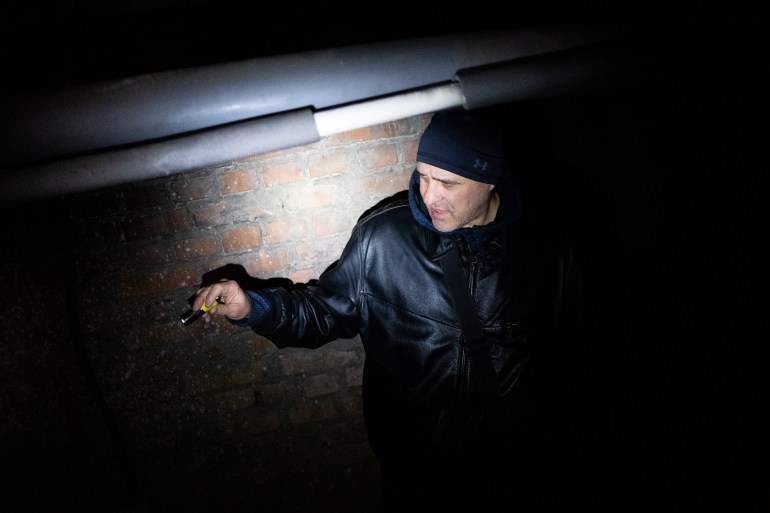
‘They will kill you’
Viktoria is houseproud and does not want to show her apartment, which she says is still in the process of being cleaned. They are now the only people currently living in the building due to the inhabitable conditions that Russian troops left most of the apartments in, including having set fire to the bathrooms, or because of structural damage caused by the heavy fighting. But some residents, most of whom are temporarily living with family members in Kyiv or the surrounding regions, have returned to salvage whatever they can or to attempt the futile task of rebuilding their homes. Dirty mattresses lie in the corridors and the car park outside after disgusted residents found that Russian soldiers had slept in their beds.
Andrii yanks open a neighbour’s door. Small glass shards lie scattered across the floor; a single L-shaped red sofa and plywood table are the only objects in the apartment.
Andrii looks out the shattered living room window and points at the Orthodox church outside. The large building, located a couple of kilometres away, is surrounded by partially destroyed homes and lush green countryside. Andrii was allowed to come upstairs to the car park to smoke a few times a day, and when he did, he says he would look out onto the horizon. He would focus on the golden cross atop the church. “I would imagine the church was like our castle that would keep us safe,” he says before joining his wife on the sofa and taking her hand in his.
During his cigarette breaks, he would see the charred frames of cars lying strewn across the car park and soldiers looting the apartments in the area. “They would take TVs, vacuum cleaners, shoes, underwear, even nylon leggings,” he says, chuckling as he suggests they may have worn the leggings under their uniforms because it was so cold.
Andrii says the soldiers stationed in their apartment block seemed inexperienced and were perhaps in their early twenties and he could hear from their accents that they came from various places in Russia, including the Rostov region which borders Ukraine in the east, and Chechnya.
The soldiers allowed residents to come up occasionally for fresh air or to smoke, but Viktoria says they “treated us like ghosts”, barely acknowledging them.
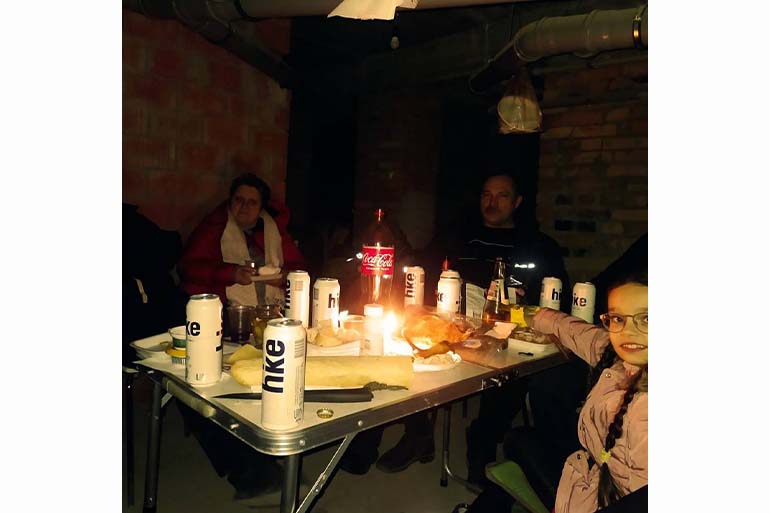
That was until one day, a week after the occupation of the block when Andrii says a soldier approached him in the car park and warned him that he should try and evacuate to the west of the country. According to Andrii, he said the next rotation of soldiers who would take over the apartment building would be much tougher. “They will kill you,” he remembers the man saying.
The soldiers had forbidden phones, but Viktoria and another resident had smuggled spare ones into the basement. So, after Andrii’s short conversation with the soldier, they attempted to contact volunteers who could help them evacuate to the west of the country. The signal was patchy; it took a few days before they reached two volunteers who were arranging evacuations.
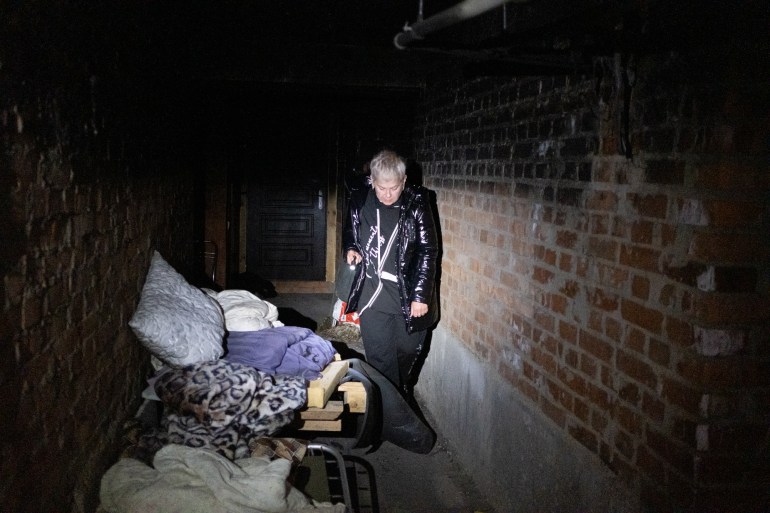
Viktoria describes the mood during those days as “calm and without panic” as the neighbours “supported each other”, but admits that as time wore on, she felt increasingly “passive aggressive” towards the soldiers living in their apartments. “I wanted to kill them, but I did not have a weapon,” she says.
Within a few hours of sending them their location, the two volunteers knocked on the heavy basement door which was located a few metres from the apartment block’s entrance, and ushered the group into a series of vehicles. A humanitarian corridor was running that day and the soldiers let them leave.
Andrii says they were lucky to avoid Russian shelling, which hit the column of vehicles behind them as they passed Bucha. Eventually, they pulled into a supermarket car park, where they boarded a bus that took them to the relative safety of the Zhytomyr region.
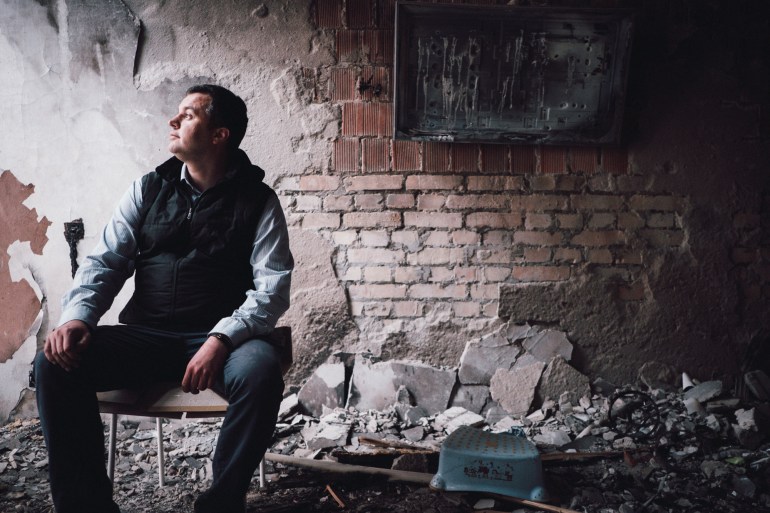
‘This is all we had’
The sense of community among the residents of the apartment block is palpable as they mingle in the corridors comparing the damage that has been wrought on their homes. Before the war, neighbours’ children played together outside. Doors stand ajar as neighbours walk in and out of each other’s apartments, sharing tools and cleaning products as well as exchanging advice.
Andriy Suravskiy, 39, a gregarious, quick-witted book salesman, bought his two-storey apartment with his wife eight years ago when the apartment block with 31 properties had just been built. They had decided to move from Kyiv to Hostomel to “live in fresh air and enjoy the silence”.
He shuffles into his kitchen, avoiding the empty vodka bottles, cutlery and mouldy food strewn across the floor. He has not had time to tidy it since he recently returned from Rivne, in the west of Ukraine, where he had fled on February 25 with his wife and two children, seven-year-old Danilo and three-year-old Dominica. Twenty-two other residents escaped on February 24 and 25.
Russian soldiers had lived in his apartment, sleeping in his children’s beds and defecating on the floor “like pigs”, he says. It is an experience that has left him “feeling stressed” but grateful that they were able to escape in time and that his family are now safe in Germany.
Suravskiy looks out of his living room; a plastic stool and his daughter’s toilet step are the only objects that remain visible among several layers of ash and scorched walls. The outer wall and part of the roof were destroyed in the fighting, leaving the room exposed to the elements. A strong gust of wind threatens to blow over a metal sheet precariously positioned above his head, so he makes his way upstairs.
Little survives of what was the top floor of the building.
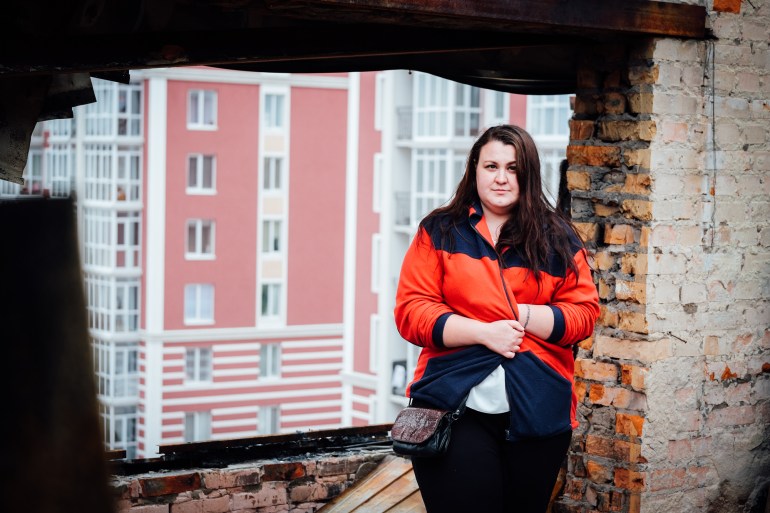
Confronting loss with humour
Anna Hlyvenko, a friendly 25-year-old bank manager, walks around the remains of her flat that once stood next to Suravskiy’s. Her hair blows across her face as she looks across what she says had been the “home of my dreams” that she and her husband had bought just one month before the invasion.
The war has left the couple unemployed and temporarily housed with her husband’s family in Poltava, a city in central Ukraine. She says she has reached out to the Kyiv City Council but they cannot currently offer her any compensation. The housing association that owns the apartment complex has also stated that it may look to demolish the building due to irreversible structural damage.
When Hlyvenko showed a picture of their apartment to their five-year-old son, she said, he told her, “Mum, give me a helmet and some bricks and I will build the apartment up again.” She pauses for a second, as rain begins to lash against the piles of rubble that surround her before saying firmly, “If he is so brave, then I must be brave too.”
On Suravskiy’s top floor, only a single patch of his roof remains. He recalls his neighbour from Israel who owned the next-door apartment calling him recently and asking if he could look for a small USB stick he had left in his desk drawer. He points at what was his neighbour’s home, now a chaotic expanse of rubble with no walls or roof and laughs, “poor guy, he had no idea!”
Suravskiy prefers to joke. “Sadness is not your friend in such a situation; I prefer to turn to humour rather than vodka,” he says.
However, he tears up as he recalls how hard he had worked on the upper floor, which had just been completed six months before the invasion. “There is a pain in me because this is all we had; it is everything I worked for and saved up for.”
As Suravskiy picks up his toolbox and heads for his car, he says he plans to rebuild his apartment so his family can return. He admits it may sound ambitious but points to where his roof had once stood and quips, “then again, who else has a penthouse with such a view of the stars!”